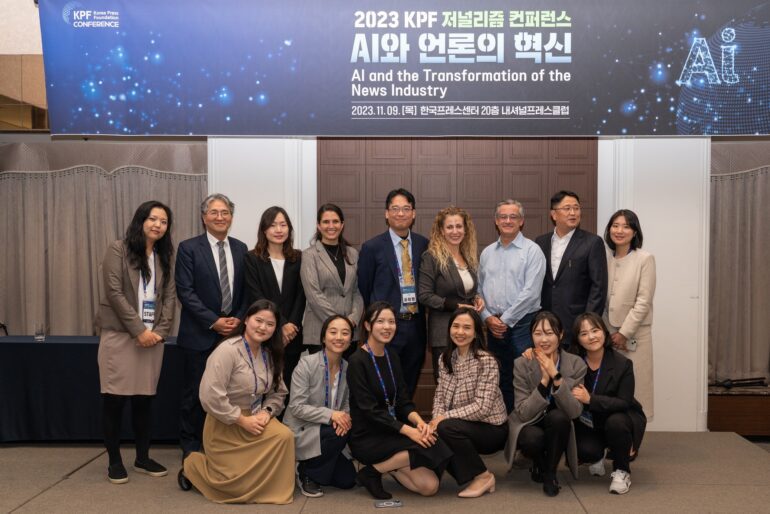TL;DR:
- Korea Press Foundation Conference 2023 focused on AI’s influence on journalism.
- Notable speakers included Elena Perotti, Charlie Beckett, Ernest Kung, and Elyse Samuels.
- Elena Perotti emphasized AI guidelines, training, and content protection.
- Ernest Kung introduced the “Local News AI Initiative” for news organizations.
- Professor Charles Beckett stressed human oversight to counter AI biases.
- Elyse Samuels discussed AI-driven investigative reporting.
- Collaboration among media organizations is crucial in the AI era.
Main AI News:
The Korea Press Foundation Journalism Conference 2023, held on November 9, brought together over 200 publishers, journalists, and media professionals under the theme “AI and the Transformation of the News Industry.” This gathering aimed to delve into the profound impact of AI technology on journalism. Distinguished speakers at the event included Elena Perotti, Executive Director of Public Affairs and Media Policy at WAN-IFRA, Charlie Beckett, Professor of Media and Communications at the London School of Economics and Political Science, Ernest Kung, AI Product Manager at the Associated Press, and Elyse Samuels, Senior Producer of Visual Forensics at the Washington Post.
Elena Perotti, in her address titled “AI and News Business Transformation,” provided valuable insights to a select group of media publishers. She offered an overview of the current utilization of Artificial Intelligence within newsrooms, explored its future potential, and shed light on governmental and international efforts to regulate its use. Perotti emphasized the necessity for publishing houses to establish internal AI guidelines, extensively train their staff, and collaborate to safeguard their content against unauthorized AI utilization while ensuring fair compensation.
Ernest Kung, AI Product Manager at the Associated Press, took the stage to discuss “How to Use Generative AI in the Newsroom.” He introduced the groundbreaking “Local News AI Initiative,” a project aimed at integrating AI technology into news production at local news organizations. Kung shared best practices from newsrooms worldwide, such as El Vocero de Puerto Rico, Michigan Radio, and WFMZ-TV. He stressed that effective AI technology utilization hinges on media organizations working together and pooling their resources.
Professor Charles Beckett underscored the importance of human oversight in newsrooms where Artificial Intelligence is employed. He addressed the risks associated with AI algorithmic biases, the lack of transparency in model training, and the imperative to uphold journalistic values such as transparency, accountability, and accuracy in the AI era.
Elyse Samuels, in her presentation titled “Visual Evidence for Investigative Reporting,” provided insights into how her team at the Washington Post leverages publicly available data, videos, and photos for comprehensive event coverage. She emphasized the need for innovative AI-driven information retrieval while cautioning journalists to remain vigilant in the face of increasingly sophisticated information manipulation facilitated by AI advancements.
A recurring theme throughout the conference was the necessity for collaboration among media organizations. In the rapidly evolving landscape of AI technology, speakers unanimously stressed the importance of a collaborative approach as publishers navigate the transformative journey ahead.
Conclusion:
The Korea Press Foundation Conference 2023 shed light on the transformative impact of AI in the journalism industry. Key takeaways include the necessity for AI guidelines, the promising Local News AI Initiative, the importance of human oversight, and the need for innovative AI-driven reporting. Collaboration among media organizations will be pivotal as the market continues to evolve with AI integration.

